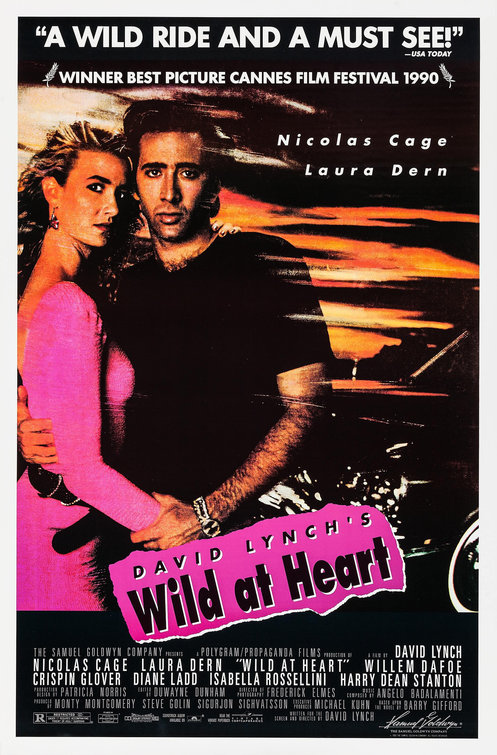

Wild at heart movie#
But the movie qualifies for an R rating by adding a little gunsmoke to the shot, so that you can't see the head coming off quite so clearly. This was the scene that got to the MPAA's film rating board, which threatened "Wild at Heart" with an X. This shot is lifted from Kurosawa's " Yojimbo," but not many people in the audience will read it as a homage.Īnd then there's the scene where the villain ( Willem Dafoe) blows off his own head with a shotgun, and the head flies through the air and bounces along on the ground. Lynch cuts to a dog running from the building with the bloody hand in its mouth. The scene, for example, when the clerk gets his hand blown off with a shotgun, and crawls around on the floor looking for it, talking about how they can sew hands back on these days. There are other such scenes in the movie. I saw the payoff as Lynch's attempt to defuse the violence - to excuse a racially charged scene of unapologetic malevolence. They like the way the look is overplayed: Cage looks like a villain in a silent movie. Some people laugh when they see this scene. Then Ripley staggers to his feet, steadies himself on the handrail, lights a cigarette, and glares up from beneath lowered brows, gasping for breath, the cigarette dangling from his lip.
Wild at heart crack#
Ripley disarms him, and then smashes him to a pulp, viciously and with great thoroughness, taking the man's hair in his hand and pounding his skull violently against the marble floor until the bones crack and blood spatters and the man is dead. He pulls a knife on Cage, whose character is the local version of Elvis Presley crossed with James Dean and Tab Hunter. The man is a killer hired by Marietta Fortune ( Diane Ladd), the evil mother of Ripley's girlfriend, Lula Pace Fortune ( Laura Dern). Take, for example, an opening scene where the hero, Sailor Ripley ( Nicolas Cage), is attacked by a black man on a staircase at a party. But "Wild at Heart" doesn't have the nerve to just be violent - it has to build in its excuses. Well, violence in itself doesn't offend me. It deals in several scenes of particularly offensive violence, and tries to excuse them by juvenile humor: It's all a joke, you see, and so if the violence offends you, you didn't get the joke. The movie is lurid melodrama, soap opera, exploitation, put-on and self-satire. There is something repulsive and manipulative about it, and even its best scenes have the flavor of a kid in the school yard, trying to show you pictures you don't feel like looking at. I do not think this is the best film that played at Cannes this year (wait until you see Depardieu in "Cyrano") and, in fact, I do not even think it is a very good film. Now comes "Wild at Heart," which won the Palme d'Or at this year's Cannes Film Festival, to great cheers and many boos, some of the latter from me. Lynch's "Twin Peaks" is a cult hit on television.

"Blue Velvet" (1986) was hailed as one of the best films of the decade. At the end of both " Blue Velvet" and "Wild at Heart," I was angry, as if a clever con-man had tried to put one over on me. But as the movie rolls along, something grows inside of me - an indignation, an unwillingness, a resistance. I sit and watch his films and am aware of his energy, his visual flair, his flashes of wit. I am aware of it, I admit to it, but I cannot think my way around it. There is something inside of me that resists the films of David Lynch.


 0 kommentar(er)
0 kommentar(er)
